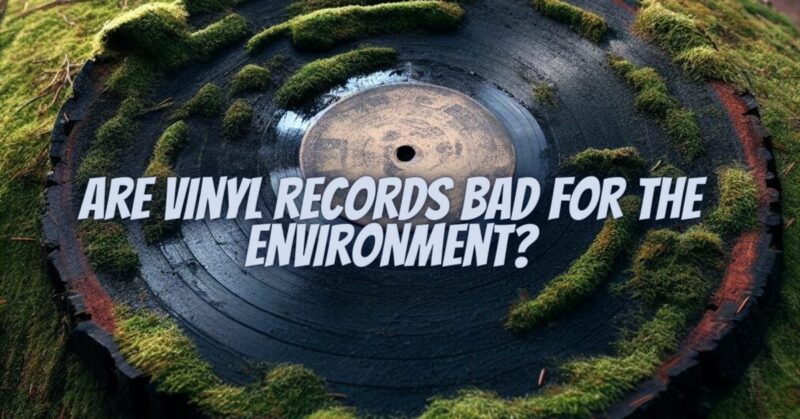Vinyl records have enjoyed a resurgence in popularity in recent years, captivating audiophiles, collectors, and music enthusiasts alike. However, as with many products, there are environmental concerns associated with vinyl record production and consumption. In this comprehensive article, we will explore the environmental impact of vinyl records, addressing both the negative aspects and potential mitigations.
The Environmental Concerns
- Production Process: Vinyl records are made from polyvinyl chloride (PVC), a type of plastic derived from fossil fuels. The production of PVC involves the use of hazardous chemicals, including chlorine and phthalates, which can have adverse environmental and health effects.
- Energy Consumption: The manufacturing process for vinyl records, including the creation of the vinyl pellets, involves significant energy consumption. This energy often comes from non-renewable sources, contributing to greenhouse gas emissions.
- Waste Generation: Vinyl records, like many plastic products, do not biodegrade and can persist in the environment for centuries if not properly managed. Discarded records contribute to plastic waste pollution.
- Transportation: Vinyl records are often shipped internationally, increasing their carbon footprint due to long-distance transportation.
- Water Usage: Vinyl manufacturing requires substantial water usage for cooling and cleaning processes, which can put pressure on local water resources.
Mitigations and Counterarguments
While vinyl records do have environmental downsides, there are mitigations and counterarguments to consider:
- Longevity: Vinyl records have a longer lifespan than many digital formats. A well-cared-for vinyl record can last for decades or even centuries, reducing the need for frequent replacements.
- Used and Vintage Market: The popularity of used and vintage vinyl records extends their life cycle and reduces the demand for new production.
- Energy Efficiency: Some vinyl pressing plants have adopted more energy-efficient and environmentally conscious manufacturing processes.
- Recycling: Although recycling PVC can be challenging, efforts are underway to develop recycling methods for vinyl records.
- Local Production: Choosing records from local pressing plants can reduce the environmental impact associated with long-distance transportation.
Alternative Pressing Materials
Some environmentally conscious musicians and labels are exploring alternative pressing materials, such as recycled vinyl and plant-based plastics. These materials aim to reduce the environmental footprint of vinyl records and offer greener alternatives for vinyl enthusiasts.
The question of whether vinyl records are bad for the environment is complex, with both negative environmental impacts and potential mitigations to consider. Vinyl records, like many products, have environmental consequences tied to their production, transportation, and waste generation. However, their longevity, appeal to collectors, and potential for recycling or alternative materials offer opportunities to minimize their impact.
As a vinyl enthusiast or collector, you can take steps to minimize your environmental footprint. Consider buying used records, supporting local pressing plants, and exploring eco-friendly alternatives. Additionally, caring for your vinyl collection to extend its lifespan can be an environmentally responsible choice.
In the end, finding a balance between the joy of vinyl and environmental responsibility involves making informed choices and contributing to ongoing efforts to make vinyl production and consumption more sustainable.


